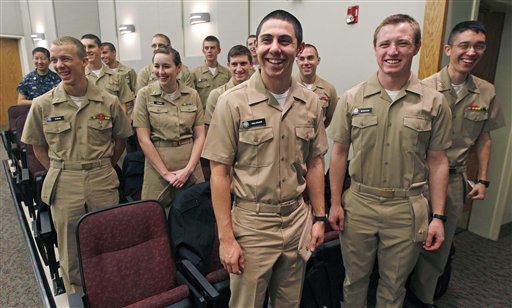
By Shea Redwine
When I graduate from college at the tender age of 22, I will be a commissioned officer in the United States Navy, on active duty and immediately responsible for the welfare of a division of sailors. Yes, I do find this prospect a bit daunting.
I am in the Navy ROTC (Reserve Officers Training Corps), and have put countless hours into preparing for how real my life is going to be when I graduate. We live in a volatile world, which becomes particularly relevant when you are going to be an officer in the military. Every update about what ISIS is up to in the Middle East that scrolls across the screens in the cafeteria is not just news; it is a reminder of why I am a Middle East Studies major, of why I wake up twice a week at 4:50 a.m. to work out and why I take two extra classes every semester.
I may be a normal eighteen-year-old college girl who enjoys wrapping up a night out with Pugsley’s just like everyone else, but I am also constantly preparing to be responsible for people’s lives.
ROTC is a challenge, but it is absolutely worth it. While most students are asleep in their beds in the early morning, we ROTC students are up rigorously working out at Physical Training (PT) sessions. Navy ROTC commutes to SUNY Maritime for PT from 6 a.m. to 7 a.m., and consequently the Midshipmen are up by 4:50 a.m. in order to make it on time to PT on Tuesdays and Thursdays. Army ROTC is up three mornings per week engaging in intensive workouts.
“For the most part, PT always includes some sort of running, either sprints or long distance,” said William Conticello, FCRH ’18. “It will also focus on upper body endurance (focusing on push-ups) as well as abdominal endurance (sit-ups) since our PT test is focused on running, pushups and sit-ups.”
Though PT is difficult, it is immensely rewarding and fosters a strong sense of community.
“I find that working out with my fellow midshipmen pushes me to my limits and keeps me going rather than giving up in the middle,” said Jingyi Huang, FCRH ’18.
On Wednesdays, when many students have the day off from classes, we carefully steam and iron our uniforms, polish our shoes and attend two military specific classes.
Both Army and Navy ROTC have one “lab” and one academic class. The lab includes active duty guest speakers, briefs on current events and leadership training. The academic classes vary according to how far into the ROTC program you are, and cover an assortment of topics ranging from Introduction to Naval Science (for Navy ROTC) to Weapons Systems, to Leadership and Ethics.
Of course it is difficult to juggle all of the normal classes, two additional ROTC classes, study halls, and other various ROTC commitments. Most of us spend anywhere from seven to eighteen hours per week on ROTC activities.
Additionally, as future leaders, we are expected to maintain an above-average GPA.
“Time management is definitely the most challenging aspect of ROTC. Sure, PT can be tough when we have to wake up at 5:00 a.m. and exercise in the cold, but it is having to devote time to physical fitness, as well as maintain a high standing academically while having a healthy social life, that makes it tough. But, ultimately, it is worth it,” said Huang.
Most of ROTC students agree that wrapping our minds around the immense responsibility we will assume right when we graduate is another challenging aspect of the program.
“By the end of our four years in college, we will be commissioned officers, and receive a salute (a traditional sign of respect) from enlisted men and women who have been serving our country for years,” said Aaron Banasiewicz, FCRH ’18. “It’s important to know, understand and respect the community we will be stepping into, and the people we will be leading.”
There are many reasons people join ROTC. For many the military is a family tradition. “My dad jokes that the first letters he taught me were R, O, T and C. He was a career Navy officer, and I have always wanted to do what he did for many years,” said James Holland, FCRH ’18.
For other ROTC students, like myself, military service is a great way to pay for college, gain invaluable leadership experience and travel the world, all while fulfilling what they view as their patriotic duty.
“I can answer this in a very patriotic way and explain how much I love America or something. But in short, ROTC allowed me to go to a great school like Fordham because of the ROTC scholarship I was awarded. But, I also always dreamed of being an army officer, and ROTC gave me the opportunity to get my college degree and reach my dream,” said Conticello.
Personally, I have always planned to serve my country, as well as go away for college, and ROTC was a great way to accomplish both. Additionally, the experience I will gain in the Navy will be invaluable regardless of the career I choose to focus on next. Though it is not an easy path, it is the right one for myself and my fellow ROTC students.
Even though being in ROTC is strenuous, and signing the next decade of my life over to the United States military was definitely intimidating, I love it. When I graduate, I will travel the world and do incredible things with incredible people when I am barely in my 20s — and I cannot wait.
Shea Redwine, FCRH ’18, is an international political economy and Middle Eastern studies major from Gilbert, AZ.









































































































































































































